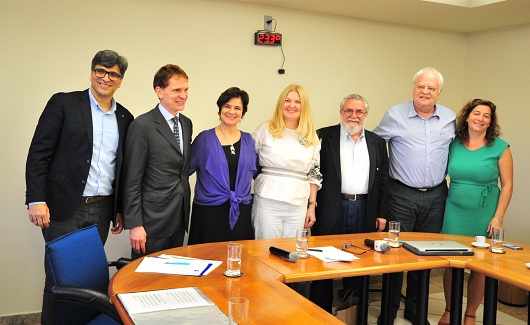Fiocruz and CNRS continue with their historical partnership
30/10/2019
Julia Dias (CCS)
Fiocruz and one of the main French research institutions, the National Center of Scientific Research (CNRS, in the French acronym), have made official the continuity of a historical partnership, with a celebratory three-day symposium and the signing of a Memorandum of Understanding (MdU). From 16 to 18 October, the joint event A cooperative agenda for health promoted exchanges between social and human science researchers applied to the health sector, and marked the celebration of the anniversaries of the two institution - together, they carry two centuries of history on their backs. In 2019 the CNRS is celebrating its 80th anniversary, while Fiocruz is getting ready to celebrate its 120 years, completed in May 2020.

“This symposium is the result of a long and productive cooperation”, explained the director of the South-American Office of the CNRS in Rio de Janeiro, Olga Anokhina. She stated that it is impossible to pinpoint exactly when the partnership began, once it was made official in 2006, but had begun before that year through the cooperation between researchers and laboratories.
“These two institutions have much in common - their tradition, their vast presence in their national territories, the diversity of research lines they embrace, and international acknowledgment”, highlighted Olga, adding that there are surely differences as well, which make the partnership even more interesting, once they complete each other.
Fiocruz president, Nísia Trindade Lima, emphasized the importance of funding agencies, such as the CNRS in France and the National Council for Scientific and Technological Development (CNPq) in Brazil, which have among its missions that of facing the ethical challenges met by science after WWII. These challenges also open to debate the importance of social sciences when it comes to thinking science. “It is important that science contemplate the issues posed by this symposium”, she stated.
The opening lecture was presented by the coordinator of the Fiocruz Global Health Center (Cris/Fiocruz), Paulo Buss, who spoke about the impact of poorness and inequality in health. The researcher presented figures on Brazil and Latin America showing how much factors such as unemployment, basic sanitation and economic crisis influence basic health indicators such as child mortality, maternal mortality and life expectancy.
In addition, the former Fiocruz president and emeritus professor of the Foundation highlighted that inequalities, not only of income, but also of gender, race and geography, are also important factors with an impact on human health. In these fields, social sciences have much to contribute so we can understand what a better health is. “The multi-dimensional character of causality in health - both biological and social - demands the convergence of different disciplines in order to generate evidence and meet health needs, as well as to overcome poorness and inequalities”, Buss stated.
The four tables of the event, held at the International Hall of the National School of Public Health (Ensp/Fiocruz), discussed contemporary issues for global health, such as migration, epidemics, vulnerable populations and access to health systems, impact of climate change and environmental disasters on health, and the challenges involved in data sharing.
“In this symposium we learned that we have many common issues related to our health systems, and also that we are part of the same world. This is why we share similar questions related to massive migratory movements, climate change, poorness and others. There are also common issues related to public decisions and individual freedom, such as problems involving vaccination or ethical issues under discussion, such as abortion and euthanasia. Lastly, we need to turn our eyes towards technological and medical innovation and the use and sharing of data in health”, says the adjunct director of the CNRS Institute of Social and Human Sciences, Marie Gaille.
Marie, who is a philosopher, considers that cooperation projects between non-English-speaking countries and between northern and southern countries, such as France and Brazil, can add much to the current debates on global health. “This symposium brought together social scientists and specialists in humanities with a tradition of multidisciplinarity, which is very significant, as health is a global theme that must be approached from different angles”, she said.
“Social sciences and humanities can and must respond to epidemics, disasters and their consequences”, said Gustavo Matta, coordinator of the Zika Network of Social Sciences and organizer of the event.
Among the actions agreed to keep the partnership going, Matta stated that they are planning another symposium, to be held in France in 2020, and the publishing of a joint paper proposing a research agenda, so they can continue to discuss the main subjects identified. Lastly, the cooperation will also include the exchange of students and researchers belonging to both institutions.




